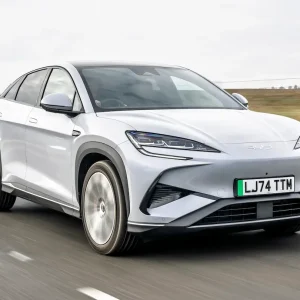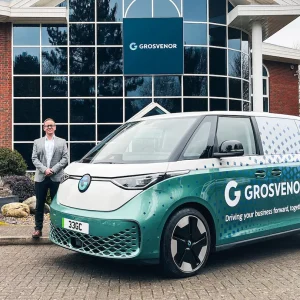
GE HealthCare, a former subsidiary of General Electric, has been a stalwart in the realm of medical innovation since its inception more than 125 years ago. Renowned globally for its advancements in medical technology, pharmaceutical diagnostics, and digital solutions, GE HealthCare offers products and services designed to revolutionise patient care. In a landmark moment in January 2023, GE HealthCare became an independent entity, breaking away from its parent company, General Electric. This pivotal move signified a deliberate shift towards a focus on its core healthcare operations and seizing growth opportunities.
Emerging from this spin-off is the inception of the GE HealthCare fleet team, which supports the global fleet of around 12,000 vehicles.
Leading the charge for Western Europe into this new era is Giovanni Elia, whose tenure as fleet manager for Southern Europe within GE Corporate paved the way for his elevation to the position of Western Europe regional sourcing leader – fleet in August 2023.
While Elia is based in Budapest, his role involves overseeing the UK fleet, forming part of global process manager Damion Bennett’s fleet leadership team, Damion was previously the European fleet optimization leader within GE HealthCare before stepping into the global role, prior to that role he served as the UK fleet manager within GE Corporate.
Elia brings with him a wealth of experience and expertise, poised to steer the newly minted fleet team towards success.
The UK fleet consists of 590 cars and sits in the top five countries for GE HealthCare in Western Europe in terms of size. Elia explains that the majority of the car fleet is utilised by field service engineers responsible for supporting healthcare equipment in hospitals.
“The overarching objective of our service team is to keep equipment running and allow them to be used at best capacity, ultimately enhancing patient care,” he explains. “What that means is at our core, our fleet team is committed to serving the ultimate end-user, which is the patient in the hospital.”
A greener future
In addition to prioritising patient welfare, GE HealthCare’s fleet team is committed to embracing sustainable practices, underscores Elia. Currently, the average CO2 emissions of GE HealthCare’s fleet in the UK stand at 53g/km. While the global target for carbon neutrality is slated for 2035, Elia’s European agenda aims for 2030, with the UK on track to possibly achieve this milestone even sooner, potentially within the current year.
Currently, around 45% of GE HealthCare’s vehicles in the UK run on full electric power, while the remainder rely on ICE, with a smaller fraction, approximately 14%, still powered by diesel. Nevertheless, Elia clarifies that “the fleet is rapidly phasing out these ICE vehicles in favour of newer, fully electric models.”
He highlights the UK’s notable progress in leading the charge towards electric energy transition, outpacing other Western European markets like the Nordics.
In the UK, Damion Bennett’s experience as the fleet manager was pivotal for the company. “Recognising his effectiveness, we seized the opportunity to showcase the UK as a role model for other countries,” Elia explains. This initiative has been a significant undertaking, spearheaded by Bennett, as he shares strategies deployed in the UK with other countries, aiming to replicate its success as part of his Globalisation strategy.
“In Western Europe, the overarching strategy closely mirrors that of the UK – prioritising the phase-out of diesel vehicles in favour of electric alternatives,” Elia explains. “Diesel usage will be restricted to exceptional circumstances,” he elaborates, “particularly for scenarios involving extensive travel, guaranteeing uninterrupted operations despite potential battery depletion.”
Similarly, the GE HealthCare fleet has opted to consider diesel vehicles as exceptions moving forward. “We acknowledge that our fuel service engineers often cover extensive distances, so there’s a recognised necessity in certain instances. However, unless there’s a compelling justification for diesel usage, it won’t be permitted,” Elia notes.
He foresees no challenges with the company’s fleet drivers in the UK, given the growing prevalence of electric vehicles in the market and the supportive infrastructure facilitating their expansion.
Reflecting on the current state of affairs, Elia tells us he believes the fleet is heading in the right direction with its vehicle choices. “Occasionally, employees express concerns about practicalities, citing challenges like the unavailability of wall boxes near their residences necessitating trips to charging stations as far as 11km away. Nevertheless, this remains an isolated issue. After all, we wouldn’t have achieved a 45% adoption rate of fully electric cars within our fleet if there wasn’t sufficient readiness among individuals to charge their vehicles,” he adds.
Interestingly, Elia says something he finds notably absent in the UK is range anxiety. “The UK seems to have largely alleviated such apprehensions, especially in comparison to other markets.,” he continues.
Elia highlights that this positive trend isn’t mirrored in all European markets. “Some countries, like Italy where I’m originally from, exhibit hesitancy in transitioning their fleets to EVs, primarily due to insufficient government support for infrastructure. This lack of support could potentially impede the successful adoption of EV technology from the outset,” he remarks.
Elia expects EVs to take on an even higher proportion of GE HealthCare’s UK fleet over the next few years.
The fleet’s global leasing partner for its vehicles is Arval, a collaboration that Elia describes as invaluable, especially during the pandemic. Through this partnership, the company has introduced an open list system, empowering drivers with a diverse array of choices from various manufacturers to cater to their individual requirements. In terms of brand diversity, the car list boasts prominent names such as Tesla, BMW, Audi, Mercedes-Benz, and Kia, listed in order of popularity within the UK fleet’s preferences. Elia notes that Teslas dominate the majority of offerings to drivers, underscoring the fleet’s unwavering commitment to electrification.
In contrast, some EU countries lack government support for EV infrastructure, hindering driver adoption. “But here in the UK, the market is charging ahead,” says Elia. “OEMs are fully committed, with plug-ins just a stepping stone to full electric. Chinese brands are already in the mix, signalling a definitive shift. This momentum, coupled with Tesla’s success, solidifies our journey towards energy transition.”
Raising the bar
Elia sheds light on the recalibrated focus of the UK market under the new team’s leadership in 2024.
“As a newly formed team, our primary aim is to harness industry expertise and fortify brand management,” he asserts.
He then goes on to underscore the operational excellence, cost efficiency, and the transition to sustainable energy as paramount objectives.
“Operational excellence emerges as a cornerstone priority for the brand, with safety serving as a fundamental pillar,” notes Elia. “Our policies are meticulously crafted to prioritise safety, encompassing comprehensive on-road training,” he emphasises.
Each driver undergoes quarterly reviews of their training, including thorough risk assessments and driving licence checks, complemented by mandatory online training for all employees. “In cases necessitating special attention, we engage directly with the driver to enhance their safety and overall fleet performance,” Elia adds.
Managing costs
Elia highlights the fleet’s continuous efforts to optimise costs, including a strategy of reallocating available cars within the fleet to drivers. “If a car meets the criteria of being in good condition and safe, we reassign it to another driver while maintaining the validity of the contract,” he explains.
In their operational approach, Elia highlights the importance of accurate mileage tracking to swiftly identify any discrepancies. “This enables the fleet to adjust contracts in accordance with best practices,” he adds, emphasising the significance of this practice for cost-optimising purposes.
Regarding the transition to electric vehicles, Elia clarifies that mileage monitoring isn’t a direct factor. “We’re already moving towards EVs as a standard practice, so it’s not a primary consideration. However, if an employee’s circumstances align with an electric vehicle, we’re open to making that switch upon contract renewal,” he assures.
Elia further explains the fleet’s commitment to cost-saving initiatives as a significant challenge. “We are dedicated to economising, as are many fleets. However, our focus extends beyond mere financial savings; we prioritise driver satisfaction,” he says.
In pursuit of this objective, the fleet consistently explores optimal vehicle options. Elia explains, “For instance, we constantly work with our preferred OEMs to ensure our discounts are optimised. This not only helps us save costs but also ensures top-quality assets for our drivers, ultimately enhancing their job satisfaction.”
Looking forward, Elia believes that the newly formed subsidiary is moving in the right direction in terms of policy and best practice, and therefore setting themselves up for success.
When asked about the ongoing importance of the fleet manager role within his company, Elia emphasises that, much like in other organisations, the role of fleet managers has undergone significant evolution over the years at GE HealthCare.
“Following the spin-off, it was GE HealthCare’s perfect opportunity to revolutionise and modernise how the fleet was managed, this resulted in both fleet operations and sourcing activities sitting in one fleet team” he says.
Elia says he’s witnessed the importance placed on the fleet manager role by his UK counterparts, and believes they’ll continue to play a pivotal role. “While the fleet manager role remains crucial, I perceive its significance lies more in the functionality it brings to the structure and sourcing operations. It’s about integrating the operational aspects as a cohesive team,” he explains. “When these components are disjointed, it can lead to various issues, with multiple individuals handling tasks simultaneously, resulting in information gaps.”
Elia and his colleagues are ready to take on the push towards clean vehicles. He says, “The industry’s momentum towards electrification is undeniable, with OEMs increasingly focusing on EVs. Despite varying government support across EU countries, our market is unmistakably headed in the right direction. As a fleet team, we’re swiftly and confidently navigating this transition, keeping pace with the changing landscape. We’re going at a high speed and in the right direction, so I’m excited to see what comes next.”





